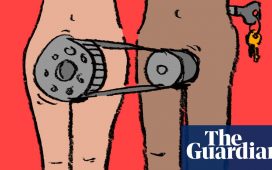The question My partner and I are both 33. We met around two years ago. He is a kind, attractive person, and from the start it felt safe, relaxed and comfortable, but not especially sparky. This is still true. Yet the more we get to know each other, the more some things improve. Unlike some of my previous partners, he is sensitive, intelligent, consistently kind, caring and generous – qualities I really value and, having had many negative experiences of dating in the past, can appreciate.
The problem is, there is some part of me that is unsure and I don’t know why. I think I’d like someone who initiated more conversation or more adventure. I love and care for him very much. I enjoy his company and feel loved; we have good sex. It all seems to be there, but I want to feel more excited, more thrilled by the relationship. The sense of passion and excitement I had in previous relationships probably came from an unhealthy dynamic, because I never knew where I stood.
So, I don’t know what to do and it is making me anxious. I feel like I am changing my mind every minute. I care for him and don’t want to hurt him, so I don’t want to talk about it with him. He says the relationship is great.
Philippa’s answer I’ve got a friend staying with me and when I read your email to her she said: “Tell her to dump him because I’ll have him.” So, how will you feel when your partner is dating my friend – or anyone else for that matter? Because he sounds like a keeper to me.
I quite often tell people who are addicted to adrenalised love that their type of romantic partner is not their type. You are likely to be obsessed (often mistaken for love) when you are not sure where you stand with someone and then, when they pay you some positive attention, you get a rush from it. Whereas when all you get is positive attention, it is easy to take that for granted. There won’t be the lows which are the reason for such highs. Is your choice between peaks and troughs versus a steady, slow build towards a longer-lasting high? Think of love as something you do – acting lovingly – rather than something you fall into. Choosing a partner is not like choosing curtains. Curtains start off great and then they fade. A relationship continues to grow and build.
Aristophanes, in his account of the origins of love, imagined that humans are cut in half by the gods and everyone has the perfect other half out there – all we have to do is find them. He has got a lot to answer for because we were never cut in half – there is no perfect match. But, three things can help. Number one is commitment: a relationship is far less likely to work without it because instead of working through problems, you are more likely to run away. Second is taking responsibility for your own feelings rather than thinking your partner is responsible for them. The third thing is time. You say, “The more we get to know each other, the more some things improve” – this is what long-term love is about, not the thrilling uncertainty of “he loves me, he loves me not”. I think you know you are building a great relationship with this person, but it is as though you also have a self-saboteur.
When you decide on something, you also end something (cide means to kill in Latin). So if you commit to this man, that means you’ve cut off the possibility of other choices. It is natural to want it all, but to have something that will do very well and is growing into something even better means saying goodbye to the possibility of those thrilling men who were less reliable.
It’s hard to make a commitment in these times of internet dating because we have an infinite amount of choice. Naturally, people do not want to make a wrong decision, but this fear of making a mistake may mean they stay on the fence – where you are right now. Not making a choice is still a decision that has consequences.
The psychologist Barry Schwartz did experiments about how much the choice we have affects how we feel about the decisions we make. When people have six chocolates to choose from, they decide quickly and are happy about their choice. When they have 100 to opt for, most people do not go for the first one they are likely to enjoy, but agonise over all of them, and then when they eventually choose one are much less satisfied with it than the people who only had a choice of six. Schwartz also found that people tend to be what he called Maximisers or Satisficers. The former hold out for perfection and the latter have a “that’ll do” attitude and guess who is overall happier? Yes, the Satisficers. You are frightened that there is something better around the corner so you are not committing. And yet the choice you commit to will give you the most satisfaction because it is the commitment, as much as – or more than – the object, that makes for a good choice. Your maximising tendency is your self-saboteur, not your friend.
PS: I’ve heard sky-diving is good for thrills.
If you have a question, send a brief email to askphilippa@observer.co.uk














